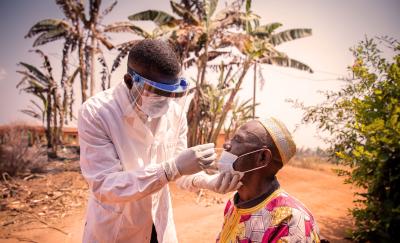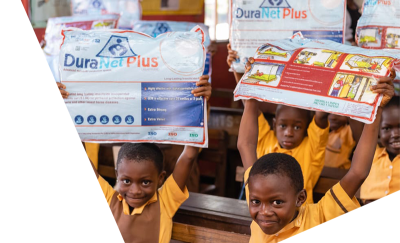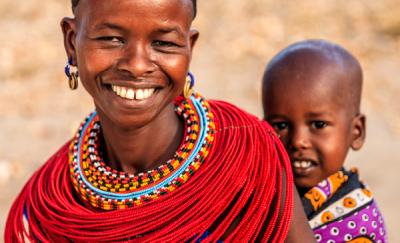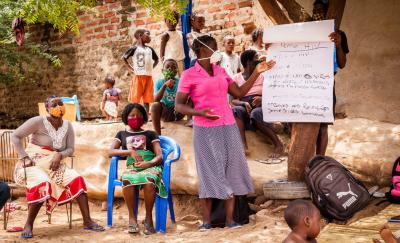Increasing Community and Facility HIV Testing in Mozambique


For Armando, a 35-year-old onion seller in the province of Niassa in northern Mozambique, the news could have been tragic. Male Champions, the Efficiencies for Clinical HIV Outcomes (ECHO) project’s male volunteers who perform outreach to other men for HIV testing, had visited the market where Armando works. They encouraged him to take a free HIV test at a health clinic, and despite the stigma attached to HIV in Mozambique, Armando (a pseudonym) and his wife, Paula, took the test. The results weren’t what they had hoped.
But the positive test results weren’t the end of the story. Community activists visited Armando and his wife at their home and counseled the couple on the importance of adhering to their treatment regimen. The ongoing supportive relationship that developed persuaded Armando and his wife to take their medication—and that probably saved their lives. “They are also my friends, and they always visit me,” Armando says of the Male Champions. “When I’m not at home, they come to the market.”
The Male Champions and community activists are an important part of ECHO, which slowly but surely is tackling the HIV and AIDS epidemic in Mozambique. HIV is the second leading cause of death in the country, which has an estimated HIV prevalence among adults of 12.6 percent, the eighth highest rate in the world.
The USAID-funded and Abt Global-led ECHO project aims to help Mozambique achieve the UNAIDS 95-95-95 global target: 95% of all people living with HIV know their HIV status, 95% of all people living with HIV receive sustained antiretroviral therapy (ART), and 95% of patients on ART are virally suppressed or have undetectable amounts of the HIV virus.
Key elements of the ECHO initiative include investing in scaling up HIV testing and increasing the number of patients starting ART. The investments target health facilities and community outreach. Referrals are a critical link between testing and treatment. When health facility staff provide self-testing kit instructions to at-risk community members, they share their contact information. When people test positive, they can use this contact information to learn how to get treatment.
Since ECHO’s inception in 2019, the project has sought to reduce the number of patients who test positive but don’t get treatment, which was as high as 33%. Why don’t people get treatment? Many patients do not have time to go through the process to access it or are worried about potential side effects. Additionally, fears of stigma and discrimination can create a psychological barrier to accepting one’s diagnosis and reaching treatment. Some spiritual beliefs about witchcraft also prevent linkage to treatment.
When patients don’t promptly connect with treatment, community activists contact the patients to let them know how to get access to ART and refer them to counselors who help them accept their diagnosis. This outreach to patients creates a clear next step for people who have tested positive. Now nearly 100% of patients testing positive initiate ART.
Mistrust of the healthcare system and stigma may discourage some people from getting tested in the first place. For that issue, ECHO employs a different tactic: dispatching community health workers to encourage HIV testing in non-healthcare settings such as schools, universities, churches, markets, football fields, interdistrict bus stops, fairs, election events, and other gathering places. ECHO distributes self-testing kits to key populations, including sex workers and at-risk members of the LGBTQ community. ECHO also doubled the number of self-testing kits distributed at the community level and began stockpiling tests to avoid shortages.
Health facilities also missed opportunities for testing. In response, ECHO rolled out testing guidance to providers that emphasized casting a wide testing net—testing all patients rather than targeting smaller groups. This aligned with a shift in the U.S. President’s Emergency Plan for AIDS Relief’s strategy. Additionally, health facilities dedicated counselors to at-risk children to ensure consistent re-testing for them, as transmission can occur at any stage of development. Health units also ensured patient privacy by creating small, enclosed spaces in clinics, known as testing corners. To address stockouts and supply chain issues related to testing kits, ECHO monitors the inventory of its facilities to ensure adequate supplies.
As a result of ECHO’s efforts, the number of people who tested for HIV in ECHO-supported facilities grew from Quarter 1 to Quarter 3 of 2023. The number of people who tested positive in the four provinces ECHO supported increased by five percent from 14,746 in Quarter 1 to 15,442 in Quarter 3. Like Armando and his wife, they learned of their situation—and could get life-saving treatment.
Read More
Infectious Diseases & Global Health Security in Sub-Saharan Africa

Global Health Security: 2024 Year in Review
Abt Global’s top global health security insights from 2024 as we look ahead to 2025.

The 2024 Annual Meeting of the American Society of Tropical Medicine & Hygiene (ASTMH)
Abt Global is presenting and exhibiting at the 2024 Annual Meeting of the American Society of Tropical Medicine & Hygiene (ASTMH).

Global Health Newsletter November 2024
In a Complex Country, What’s Working for Better Health Peru Approves Groundbreaking Law to Extend Health Coverage for Migrants with HIV and TB Furthering Jamaica’s One Health Approach New Evidence for Patient-Centered HIV Service Delivery Approaches in Mozambique Funding Model Helps Bangladesh Expand Primary Health Care Centering Community at the Heart of ITN Distribution Campaigns in Côte d’Ivoire Tackling Antimicrobial Resistance: Integration and Systems Strengthening Spotlighting the Power of Solar for Primary Health in Nigeria’s Off-Grid Communities Global Migration and Health: Beyond a Humanitarian Response Scaling Innovative Locally Led Solutions to Global Health Security Threats in Madagascar Transforming Healthcare Systems in Tanzania Through Digitalization

Insights and Approaches from Five Years of Addressing HIV Epidemic Control in Mozambique
The ECHO project is advancing HIV epidemic control in Mozambique through innovative approaches, local empowerment, and sustainable strategies for testing, treatment, and viral load suppression